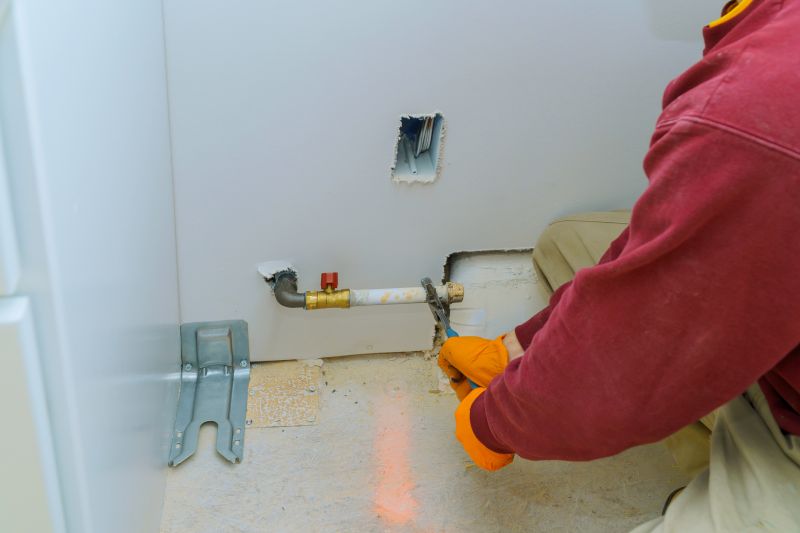Leading Gas Line Service Solutions for Safe and Effective Work
Choose from a curated selection of essential products that support professional gas line installation and repair.
 Gas line service is a critical aspect of maintaining safe and efficient fuel systems in residential, commercial, and industrial settings. Proper tools and products are essential for installing, repairing, and inspecting gas lines to ensure compliance with safety standards. These products range from basic fittings and connectors to specialized testing equipment, each designed to address specific needs within gas line maintenance. Whether you're a professional technician or a dedicated DIY enthusiast, selecting the right products can help facilitate smooth and safe gas line operations.
Gas line service is a critical aspect of maintaining safe and efficient fuel systems in residential, commercial, and industrial settings. Proper tools and products are essential for installing, repairing, and inspecting gas lines to ensure compliance with safety standards. These products range from basic fittings and connectors to specialized testing equipment, each designed to address specific needs within gas line maintenance. Whether you're a professional technician or a dedicated DIY enthusiast, selecting the right products can help facilitate smooth and safe gas line operations.
Top Overall Option
Comprehensive Gas Line Service Kit
A versatile and complete kit that includes a variety of fittings, connectors, and testing tools designed for multiple gas line maintenance tasks. It offers durability and reliability, making it suitable for both professional and DIY use, ensuring safety and efficiency in gas line servicing.
Types of Products For Gas Line Service
Gas Line Fittings and Connectors
Various fittings and connectors designed to join or adapt gas lines securely and safely for different pipe sizes and materials.
Gas Line Test Gauges
Devices used to measure pressure and detect leaks within gas systems, ensuring safety and proper operation.
Leak Detection Solutions
Specialized solutions or detectors used to identify leaks in gas lines quickly and accurately.
Pipe Cutters and Threaders
Tools designed to cut and thread gas pipes for proper fitting and installation.
Gas Line Repair Clamps
Clamps used to temporarily or permanently repair damaged sections of gas lines.
Pressure Regulators
Devices that control and maintain consistent pressure within gas systems.
Gas Line Cleaners
Products designed to clean and remove debris from gas pipes to maintain proper flow.
Thread Sealants and Tapes
Sealants used to ensure leak-proof connections in threaded gas fittings.
Gas Valve Wrenches
Tools specifically designed for installing, adjusting, or removing gas valves.
Portable Gas Leak Detectors
Handheld devices for quick leak detection in various settings.
Gas Line Inspection Cameras
Cameras used to visually inspect the interior of gas pipes for damage or blockages.
Gas Line Repair Kits
Complete kits that include essential components for repairing gas lines in emergency or routine scenarios.
Flame Sensors and Testers
Tools used to verify proper combustion and flame presence in gas appliances.
Gas Line Expansion Joints
Flexible joints that accommodate movement and prevent stress on gas piping.
Gas Line Support Brackets
Mounting hardware to secure gas pipes in place and prevent sagging or movement.
Popular Choices
Popular for verifying system integrity through pressure testing, these kits include gauges and adapters.
Widely used for quick identification of leaks in gas fittings and connections.
Easy-to-install connectors that accommodate movement and reduce stress on piping.
Essential for tightening or loosening threaded gas pipe fittings.
Frequently used for quick repairs on damaged sections of gas piping.
Handheld devices favored for their ease of use during inspections and troubleshooting.
Popular for detailed internal pipe inspections, especially in confined spaces.
Commonly used to connect different sizes and types of gas piping securely.
Frequently selected for maintaining consistent gas pressure in systems.
Effective in identifying minute leaks, making them a popular choice for safety checks.
Widely used for ensuring leak-proof threaded connections in gas piping.
Popular for maintaining clean and unobstructed gas pipes.
When working with gas lines, safety considerations are paramount. Using high-quality, durable products minimizes the risk of leaks, corrosion, or failure. It is also important to have access to reliable tools that can withstand the pressures and conditions typical of gas line systems. Properly rated and certified products contribute to overall safety and operational efficiency, helping prevent potential hazards associated with gas leaks or system failures.
Additionally, versatility in product selection can be beneficial. Different projects may require various fittings, connectors, or testing devices. Having a comprehensive set of tools and components allows for flexibility and preparedness, whether performing routine inspections, emergency repairs, or new installations. Investing in a well-rounded collection of gas line service products can streamline workflows and support adherence to safety protocols.
Understanding the range of available products and their specific applications helps ensure that gas line service tasks are completed accurately and safely. From specialized testing equipment to adaptable fittings, the right products can make a significant difference in the quality and safety of gas line maintenance work. Proper knowledge and selection of these tools are key to maintaining the integrity of gas systems in any setting.
Key Buying Considerations
- Compatibility with existing gas piping materials and sizes
- Certification and compliance with safety standards
- Durability and resistance to corrosion or wear
- Ease of installation and use
- Range of compatible fittings and accessories
- Accuracy and reliability of testing and measurement tools
- Portability for on-site inspections and repairs
- Availability of replacement parts and support
- Cost-effectiveness for your specific project or needs
- Brand reputation and customer reviews
- Warranty and product guarantees
- Ease of cleaning and maintenance
- Compatibility with other tools and equipment in your toolkit
- Safety features such as leak-proof seals and pressure ratings
- Environmental conditions where the products will be used
